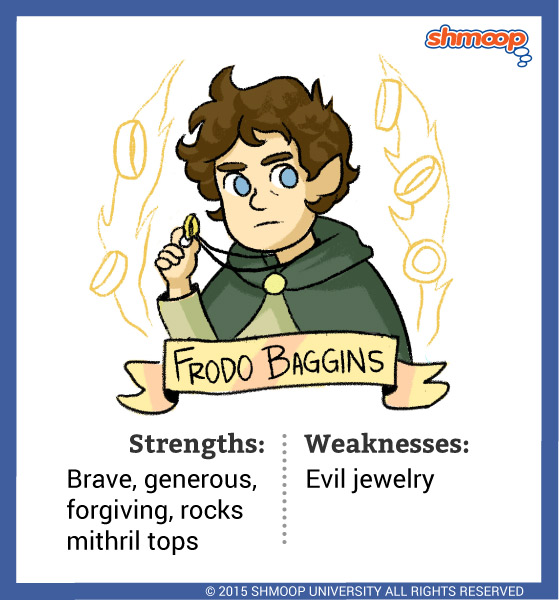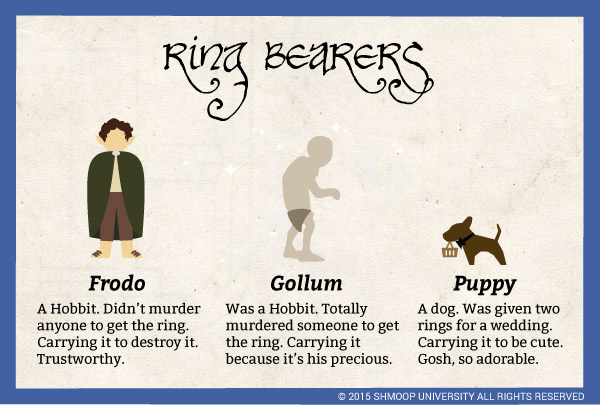Character Analysis

(Click the character infographic to download.)
When Peter Jackson directed his film version of The Fellowship of the Rings, he made a lot of changes to the story line of the book. Probably the biggest change is Frodo's giant baby blue eyes. Those huge eyes – so often looking on the edge of tears, especially when Sam is imparting some piece of wisdom to "Mr. Frooo ~ oodo!" – absolutely do not appear in the original novel. In Tolkien's vision, poor Frodo is completely unromantic: "A stout little fellow with red cheeks" (10.34). Oh sure, he may also be "taller than some and fairer than most [with a] cleft in his chin: [a] perky chap with a bright eye" (10.34); but Frodo is still a Hobbit, and that means he's short, plump, and a bit plain.
Frodo is an extraordinary Hobbit, that's for sure. We don't see any of the Boffins, Bolgers, or Proudfoots volunteering to carry Sauron's One Ring into the fires of Mount Doom. At the same time, he's not as obviously heroic as many of the other people in the Fellowship, say, Aragorn or Legolas. So why pick a Hobbit hero as the center of the Lord of the Rings trilogies?
Peter Jackson may make Frodo more beautiful than he is in the books, but Tolkien has a definite purpose in mind by keeping Frodo homely. After all, as we discuss in "What's Up With the Ending?" Tolkien wants these books to be about "the ennoblement of the ignoble" (source, 220; in a letter to the Houghton Mifflin Co). The "ignoble" are the lowly, ordinary people. To "ennoble" them means to make them greater, to make them more noble. Frodo is exceptional for a Hobbit in The Fellowship of the Ring, but by the end of the Lord of the Rings trilogy, he is just going to be plain old amazing, full stop. If Frodo didn't start out from a position of ordinariness, his transformation over the course of the three novels would be harder to observe.
Frodo Baggins: The Shire Weirdo
Just because Frodo is "ignoble" in The Fellowship of the Ring doesn't mean that his life is ordinary by Shire standards. First of all, he's an orphan, the son of Primula and Drogo Baggins. (Drogo? Seriously? Hobbit names are so bizarre.) He gets adopted by eccentric wanderer Bilbo Baggins (see our Hobbit learning guide for more on this guy), and he actually seems to believe Bilbo's wild stories about the trolls and dragons of Middle-earth. The miller, Ted Sandyman, tells Sam quite frankly: "Leastways old Bilbo was cracked, and Frodo's cracking. If that's where you get your news from, you'll never want for moonshine" (1.2.29). So even though Frodo may seem like a little guy in front of noble heroes like Elrond or Gandalf, he doesn't really fit in at the Shire, either. Everyone in the area thinks he and his uncle are nuts.
Frodo and Bilbo: MFEO
In a lot of ways, Frodo is a double for Bilbo. The two of them share birthdays (September 22nd) and dubious reputations in the neighborhood (since most Hobbits think they are both crazed). Frodo sets out for his grand adventure when he is fifty years old, just as Bilbo did at the beginning of The Hobbit. (Keep in mind that Hobbit ages run a little differently from human ages, so Frodo at fifty is not as old as a human would be at fifty). But despite these parallels, Bilbo's is a comic story and Frodo's is rather tragic.
Frodo doesn't follow in his uncles comic footsteps because he's respected much more. For example, he addresses High Elf Gildor Inglorion in his own language, and Gildor responds in awe: "I name you Elf-friend; and may the stars shine upon the end of your road! Seldom have we had such delight in strangers, and it is fair to hear words of the Ancient Speech from the lips of other wanderers in the world" (1.3.171). What is more, while Frodo is staying with Tom Bombadil, he has psychic dreams. While he sleeps, he sees a white figure at the top of a tall tower, soon carried off by a great eagle. Later, we discover that this must have been Gandalf at the top of Orthanc, escaping from Saruman.
So Frodo is an "Elf-friend" and a psychic. He's obviously starting off from a nobler place than Bilbo ever did. Which means that his ending will probably be correspondingly greater (and more tragic).
Frodo Gets By With a Little Help From His Friends
We'll be honest: there is absolutely no way that Frodo can succeed in throwing the Ring into Mount Doom. Seriously. He freaks out when Gandalf tosses the Ring into his fireplace in the Shire in Book 1, Chapter 2 – how is he going to respond when he and the Ring are standing right at the center of Sauron's power?

(Click the infographic to download.)
Even so, Frodo starts his journey. He sets off from Rivendell wounded and disoriented, but he knows that someone has to go on this horrible journey; it may as well be him. Frodo's decision to head to Mordor on this impossible quest changes him, not just mentally but physically. When Gandalf sees Frodo recovering from his Morgul-blade injury at Rivendell, he observes:
But to [Gandalf's] eye there was a faint change, just a hint as it were of transparency about him, and especially about the left hand that lay outside upon the coverlet.
"Still that must be expected," said Gandalf to himself. "He is not half through yet, and to what he will come in the end not even Elrond can foretell. Not to evil, I think. He may become like a glass filled with clear light for eyes to see that can." (2.1.51-2)
Frodo is becoming something other than a regular Hobbit, something even Gandalf cannot understand. Plus, there are other things to worry about: like, you know, not being immune to the Ring (he is a mortal, after all). He is small and inexperienced, so he isn't suited for an adventure into Mordor. How on Middle-earth is he going to pull this whole business of the Ring quest off?
Poor Frodo may be doomed to suffer with the Ring in his hands (look at what the Ring has done to Gollum, for crying out loud!). All the same, he has one huge thing in his favor: love. Not only does Frodo take the Ring so that he can destroy it and protect his home, but he also inspires total devotion in the friends around him.
Sam insists on going with Frodo into the dark unknown of Mordor, even though he isn't even invited to the Council of Elrond. While Elrond is deciding the membership of the Fellowship of the Ring, Merry and Pippin insist on coming; Gandalf councils Elrond to let them go along, since "in this matter it would be well to trust rather to their friendship than to great wisdom" (2.3.43). Love is the one weapon the good people of Middle-earth have that Sauron does not. (Echoes of Voldemort, anyone? Clearly, J.K. Rowling owes J.R.R. Tolkien a debt.) And Frodo's ability to make friends gives him more strength against the Ring than all the weapons of the Fellowship combined.
For that reason, we think he'll be okay. For now.
Timeline